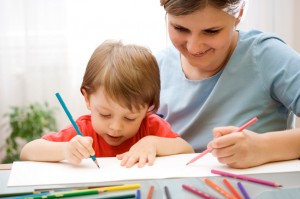
As the heading indicates, the child and parent relationship, like all other relationships requires space. Space, here, refers to respecting each other’s perspective, communicating the feedback constructively, and acting, behaving and thinking towards nurturing the relationship. Maintaining this kind of space helps reduce the uncomfortable zones, builds on trust and helps in the overall development of the child.
 Hence, irrespective of whether, it is a parent or a child, it is vital to accept the self unconditionally. Accepting the self conditionally – I must be approved by my son or daughter i.e; for e.g, all my decisions must be accepted blindly, otherwise I am an inadequate and a worthless individual – leads to many difficulties like being very strict with the children, making unrealistic and illogical demands from the children, etc. It makes the person anxious about his/her performance in any task (professionally at work or house old work), increase self-inefficacy and hence increases the tendency to fail in the given task at hand. The unconditional self-acceptance helps the person to accept the other person in the relationship, which plays an important key for sustaining the relationship during the rough times. It would be helpful, if parents understand that they are fallible individuals and that they cannot always succeed at important tasks, and even if they succeed more than others do they would not necessarily make themselves approve by their child, the way they desire. Parents’ unconditional self-acceptance has a spill over effect on their behaviour with their child, as a result of which the favourable behaviour of the child can be increased.
Hence, irrespective of whether, it is a parent or a child, it is vital to accept the self unconditionally. Accepting the self conditionally – I must be approved by my son or daughter i.e; for e.g, all my decisions must be accepted blindly, otherwise I am an inadequate and a worthless individual – leads to many difficulties like being very strict with the children, making unrealistic and illogical demands from the children, etc. It makes the person anxious about his/her performance in any task (professionally at work or house old work), increase self-inefficacy and hence increases the tendency to fail in the given task at hand. The unconditional self-acceptance helps the person to accept the other person in the relationship, which plays an important key for sustaining the relationship during the rough times. It would be helpful, if parents understand that they are fallible individuals and that they cannot always succeed at important tasks, and even if they succeed more than others do they would not necessarily make themselves approve by their child, the way they desire. Parents’ unconditional self-acceptance has a spill over effect on their behaviour with their child, as a result of which the favourable behaviour of the child can be increased.
Only with the intention to accept the self unconditionally, one may be able to follow the following points as a parent to deal with the young one.
 1. The parental impact: Observe and understand your positive and negative influence on your son or the daughter. Most children as well as adolescents show that they are least bother about whatever the parents are saying, however, according to research children are highly influenced by the parental way of communication.
1. The parental impact: Observe and understand your positive and negative influence on your son or the daughter. Most children as well as adolescents show that they are least bother about whatever the parents are saying, however, according to research children are highly influenced by the parental way of communication.
2. Being empathetic: Understanding the child’s thoughts and feeling, as if yours, without loosing the as if quality, is being empathetic towards children. Many parents think that insulting and revealing child’s issues in the presence of guest or other family will improve the child’s behaviour. However, during such circumstances, the child feels uncomfortable, highly insulted, hurt, and hates the parent for the same, which in turn increases the possibility to continue the unfavourable behaviour as well initiate new disruptive behaviour.
3. The way and mode of communication: The effective and harmless way of communication leads to a strong child and parent relationship. The clearer, rational, and empathetic way of communication within the parents and children, the better is their ability to solve problem and make rational decision together. Moreover, a good communication mode also helps both the parties to understand the each other better and deal with each other in the daily life. As a part of effective communication, the following ways would be helpful-
- Being creative with commands
- Avoiding mix messages
- Accepting faults
- Rational reasoning
 4. Modeling: Modeling is another effective way of communication. Children modeling the parents and other elders around them is a part of developmental milestones. Hence parent must behave in the line with the desired favourable behaviour.
4. Modeling: Modeling is another effective way of communication. Children modeling the parents and other elders around them is a part of developmental milestones. Hence parent must behave in the line with the desired favourable behaviour.
5. The definition of love: Parents must observe on the definition of love that they are portraying for their children through their ways of communication, rational behind gifting people, compassion and kindness, prosocial behaviours, communications among the adults, etc. Parents must also check their tendency to feel the guilt for not spending the quantity time with their children. Because of such a guilt, many parents land up providing gifts to the children to an extent that the definition of love from a feeling of belongingness turns into materialistic give and take, which could lead to various serious relationship problems latter in life.
6. Being approachable: Being approachable in all situations, avoids children from engaging in lying and stealing behaviours. Presenting the rational for every behaviour, thought and judgement in the age appropriate manner helps child to comply with the rules that are set at home, school or other social settings.
Like other relationships, even child and parent relationship, are dependent on empathy, ways of communicating and being approachable. It is important for the children as well, to maintain the strength of their relationship with parents.
Therefore, the following elaborations would help children to strengthen their relationship with their family.
 Understanding parents love: Understanding parents’ worries, concerns and anxieties would help the children or teenagers to cope with the parental pressures and communicate their wants effectively. The child’s acceptance of his/her self helps the child to express his / her love and care for the parents, this helps the child to understand the parental anxieties and concerns. The behaviour of such children reflects through their feelings accurately which enhances parents’ trust.
Understanding parents love: Understanding parents’ worries, concerns and anxieties would help the children or teenagers to cope with the parental pressures and communicate their wants effectively. The child’s acceptance of his/her self helps the child to express his / her love and care for the parents, this helps the child to understand the parental anxieties and concerns. The behaviour of such children reflects through their feelings accurately which enhances parents’ trust.- Communication skills: Communicating with the parents with respect, love and kindness enhances parent’s expression of love and communication skills.
- Making friendships: Helping and updating the parents about the current trends, the latest technologies, accompanying with them in social functions, shopping and household chores, helps the parents to feel better about themselves and gives them the feeling of belongingness.
Child and parent relationship plays an important role in the child’s life as well as serves as a training ground for the future relationships.

How can I build the relation with my child if S/he refuses to listen to me?
Hi Mr.Veer,
Your story is one I have heard so many times, sometimes it is best to give your child some space and time for them to interact with you. You can also check out our section on student’s and parent’s space as it has insights on these issues and lots more.
What should I do to get my child’s attention so that s/he will listen to what I have to say?
Hi Mrs. Sona,
Well your situation is one that is common and a little help can go a long way, so you can checkout our Parent’s and student’s space as it has tips on how to tackle such situations.
How can I communicate with my child if S/he refuses to listen to what I have to say?
Hi Mayur,
Your story is one I’ve heard often. Therefore our blog on bridging the communicationand generation gap will be very helpful.
What do I need to do; to get my child’s attention, so that I can rebuild our relation?
Hi Mr. Pankaj,
Im sorry to here that but sometimes giving your child some space and time can help the situation and thus rebuild the relationship. So be patient.